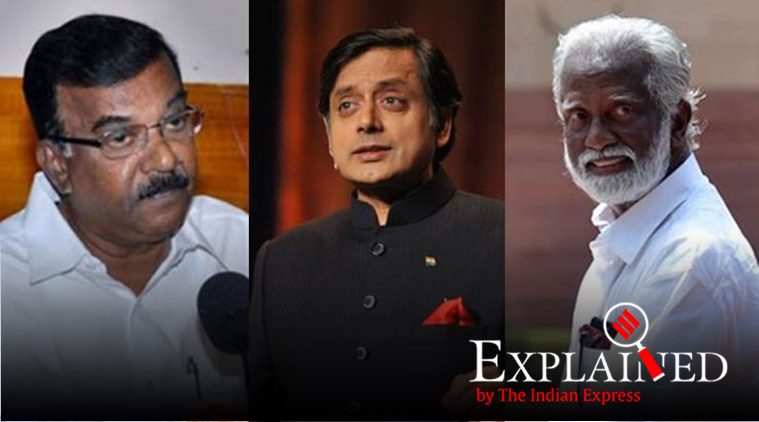Importance of Thiruvananthapuram in BJP’s scheme of things in Kerala
Rajasekharan’s candidature from the Thiruvananthapuram seat as the BJP nominee is almost final. A formal announcement is awaited any day.
 From left, CPI’s C Divakaran, Congress’ Shashi Tharoor and BJP’s Kummanam Rajasekharan, the probable candidates in Thiruvananthapuram. (File)
From left, CPI’s C Divakaran, Congress’ Shashi Tharoor and BJP’s Kummanam Rajasekharan, the probable candidates in Thiruvananthapuram. (File)
The BJP has decided to roll out its big guns in pursuit of its first Lok Sabha seat in Kerala. By getting Kummanam Rajasekharan, the 66-year-old former president of the state unit, out of the Aizawl Raj Bhavan within a year of his assuming office, and into the heat and dust of the Kerala elections, the BJP has signalled its willingness to listen to the local cadre, and also respect the wishes of the RSS, which had wanted Rajasekharan’s return.
Rajasekharan’s candidature from the Thiruvananthapuram seat is all but final, and the formal announcement could come any day. He will take on Congress sitting MP Shashi Tharoor, who won in 2009 as well, and C Divakaran, the strong CPI candidate who knows the politics of the constituency very well.
Over the next couple of weeks, Thiruvananthapuram will likely become the focal point of the BJP campaign in the state, drawing media attention to the seat. Political observers are by and large agreed that this is the only seat out of the 20 that the BJP can hope to capture. There are, indeed, seats like Pathanamthitta, Palakkad, and Thrissur, at which the party will likely post a strong performance, eating into the votes of either the CPM or the Congress. These are seats at which the BJP’s sustained agitation against the entry of women into the Sabarimala temple might even power it to second place.
But Thiruvananthapuram will be the seat to watch — and here’s why.
The first reason is the BJP’s meteoric growth in the seat. In the 2009 elections, the BJP candidate polled 11 per cent of votes while Tharoor and P Ramachandran Nair of the CPI got 44 per cent and 30 per cent respectively. Five years later, propelled by the Narendra Modi wave, the BJP got as much as 32 per cent, and the BJP’s old warhorse O Rajagopal lost to Tharoor by just 15,000 votes. Rajagopal finished first in four of the seven Assembly segments — Kazhakootam, Vattiyoorkavu, Thiruvananthapuram and Nemom. Tharoor was also helped by the fact that the CPI fielded a weak candidate, Bennett Abraham. In the 2016 Assembly elections, the BJP’s overall vote share was 27%, and it was able to clinch its first Assembly victory in Nemom. In Vattiyoorkavu and Kazhakootam, it finished second, getting many more votes than it usually gets in state elections.
Second, social and caste demographics in Thiruvananthapuram are in the party’s favour. Kerala’s large minority population has made the state difficult for the BJP to crack; however, Thiruvananthapuram has an over 60% Hindu vote spread across the constituency, with a predominant share of Nair and Ezhava votes. The Nair Service Society has been sympathetic to the BJP on Sabarimala, and the party hopes that its alliance with the Bharat Dharma Jana Sena (BDJS) will bring it a chunk of Ezhava votes. The middle class in the constituency, comprising government employees, has been known to lean towards the BJP.
Read | Common thread in LDF campaign: Congress is no different from BJP
The third reason is the robust network of the RSS in the capital. Kazhakootam, Nemom and the old Fort area have been RSS bastions for decades. Unlike previous elections, when RSS cadres in the state have stayed away from the campaign on account of differences with the BJP state unit, this time the Sangh Parivar would be out in full force for Rajasekharan, local leaders say.
Fourth, Rajasekharan’s image of a hardline, yet soft-spoken, Hindutva leader could work to the BJP’s advantage in Thiruvananthapuram. He’s also seen as a leader who is not interested in material thinks, leads a simple life, and was happy to give up the Governor’s post to return to active politics. Before his entry into the BJP, he was the state secretary of the Hindu Aikya Vedi, a fringe outfit focussed on “protecting Hindu temples and heritage”. He had cut his teeth in the early 80s in the popular Nilakkal agitation when Hindus and Christians crossed swords over the building of a church near a temple. Nilakkal is today one of the base camps of the annual Sabarimala pilgrimage.
Fifth, the state capital witnessed frequent protests and agitations in the aftermath of the Supreme Court verdict on Sabarimala. The party believes that its role in “protecting temple traditions and Hindu ethos” will find resonance with voters, especially in the capital’s urban areas and, helped by Rajasekharan’s candidature, could get it over the finish line first.
A victory in Thiruvananthapuram will give a tremendous boost to the BJP ahead of the 2021 Assembly elections. Defeat will, likewise, dent its morale and impact its chances across the state.
Photos

- 01
- 02
- 03
- 04
- 05



































